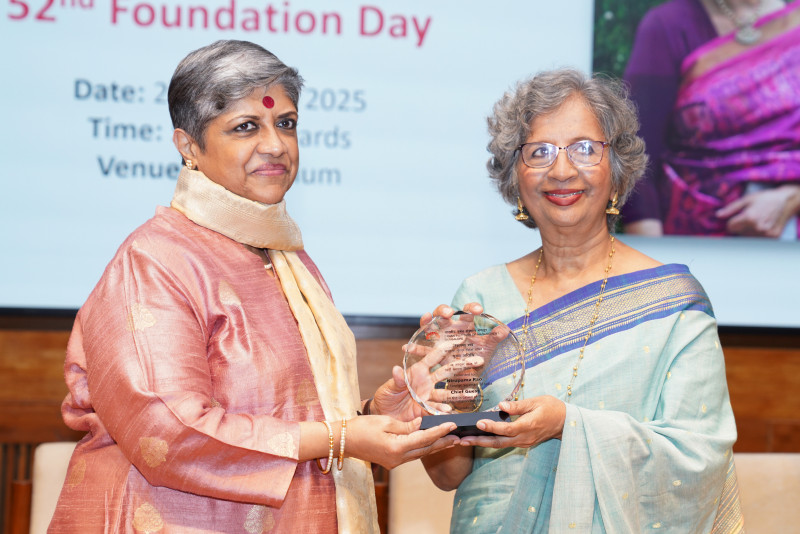"The vocabulary of global affairs has shifted, and IIM Bangalore has the heritage and capacity to lead this shift. IIMB graduates already influence policy, build institutions, scale companies, and strengthen civil society. This institution has always produced builders – of ideas, of enterprises, of institutions that last", observed Nirupama Rao, former Foreign Secretary of India, while delivering the Foundation Day lecture on, 'Beyond Borders: Preparing for a World in Transition', during IIM Bangalore's 52nd Foundation Day celebrations, earlier today. The entire IIMB community, comprising students, faculty, former faculty, alumni and staff, were part of the event which included speeches, awards, and much more.
A former Indian diplomat, Nirupama Rao was Foreign Secretary to the Government of India (2009-2011). She was the first woman spokesperson (2001-02) of the Indian Foreign Office. She served as India's first woman High Commissioner (Ambassador) to Sri Lanka (2004-2006) and to the People's Republic of China (2006-2009). She was Ambassador of India to the United States from 2011 to 2013. In retirement, she has taught at Brown and Columbia Universities, was a Fellow at The New School in New York, and a Public Policy Fellow at the Wilson Center in Washington D.C. She is also the Vice Chairman of Tibet House, New Delhi, the Cultural Centre of His Holiness the Dalai Lama. Her book titled, 'The Fractured Himalaya: India Tibet China 1949-1962', was published in 2021.
Leadership guided by integrity, empathy, courage, responsibility and public purpose
A seasoned diplomat with extensive knowledge, skills and proficiency in a variety of fields, Nirupama Rao explained the current state of geopolitics. "Geopolitics today is no longer about territory and force alone – supply chains are the new borders; technology the new territory; data the new diplomacy; climate the new conflict line and narrative the new battleground. In short, geoeconomics now determines corporate destiny. New-age leaders must be geopolitically literate. Economically, we have moved from a world optimized for efficiency to a world reorganized for resilience. This is not de-globalization, but re-globalization, built on diversification, trusted partners, and shock-resistant systems."
"The world's operating system is moving toward multipolarity, and power is no longer stored in one capital or expressed through one model. India has been pivotal in this shift, and this is why India's presidency of the G20 mattered – it was a moment of realignment with India shaping the narrative."
Stating that the world's changing order is common knowledge, she added that the real question was whether the country will shape this transition or be shaped by it. "India has an ecosystem that combines democratic stability, demographic vitality, digital inclusion, and a deepening manufacturing base. We are moving from the back office of the world to being the digital architect of the world, and increasingly, we could be and must become, the production platform for the world. The world is not looking at production that is the cheapest, but one that is the safest."
Her talk also explored the decisive capitals of tomorrow, which she said, will not be financial capital alone. "They will include trust capital, data capital, demographic capital, climate capital and cultural capital. India has strengths across all five." She also made special mention of integrity and accountability, in the context of leadership as well as in the face of the challenges brought about by advanced technology. "Leadership in technology must be ethical. We must therefore lead not only in AI development but in AI governance, which must be transparent, accountable and human-centered. Technology must serve humanity, not replace it. And ethics should not be limited to the confines of compliance. India can help frame the answers by anchoring innovation to humanity."
The issue of climate change featured prominently in her address. "Climate change now determines economic destiny and national security. The climate discourse must move from guilt to responsibility and from pledges to execution. Sustainability must become the language of business, not only of policy." She also stressed on the role of women for boosting economic, social and political progress for all. "Women's leadership is not a social add-on; it is a strategic imperative", she pointed out.
Nirupama Rao suggested that India's development journey, being robust, can offer a framework that others can adopt – democracy that delivers, development that includes and digital for public good. "Leadership must return to the principles of integrity, empathy, courage, responsibility and public purpose. Leadership begins with respect, and not entitlement. Although profit is not illegitimate, but profit without purpose is incomplete. Logic without empathy becomes indifference. India is no longer waiting to be invited to shape the global agenda. India wants to co-author the script. Our purpose is development as justice, growth that broadens opportunity and deepens dignity. The collective dream is that of a nation that refuses to leave anyone behind. In a world that often speaks the language of fear, India insists on the grammar of hope – backed by competence, courage and openness."
Drawing a comparison between leadership and literature, she said that true leaders are not the ones who have most of the answers, but those who remain curious the longest. "Power is not what you simply possess, but it is what others entrust you with."
She urged higher education institutes like IIM Bangalore to move from teaching problem-solving to cultivating future-building. "The world needs leaders who are economically intelligent and geopolitically aware; technologically fluent and ethically grounded; data-driven and human-centred; competitive in markets and collaborative across borders; ambitious in goals and anchored in purpose. The age of single-discipline leadership is past. This is the age of integrated leadership – leaders who translate across domains. An enlightened India shaped by knowledge, justice and human dignity is our collective responsibility, where intellect is valued, inquiry is free, and humanism is a lived ethic."
She offered a leadership compass for a world in transition, led by hope and backed by competence and courage. "Diversity is not a weakness, but a power to be unleashed. Where you come from is no indication of where you can go. Lead beyond borders, design for impact, choose character over convenience, solve for humanity, build resilience before scale, let purpose be your strategy, and celebrate courage. Learn from global best practices, learn to listen attentively and incorporate Visvavidya into your plans for the future. Public service is the bridge to your future...and progress must not come at the cost of dignity."
Calling the IIMB student community the architects of the new era, she shared what she called 'civilizational values'. "You are not only future managers; you are trustees of India's next quarter century. Hence, choose to lead with courage and humility, with innovation and integrity, with ambition and empathy. Let us build markets that reward responsibility, technologies that expand dignity, and institutions that outlast the moment. Build something worthy of this moment, this nation, and the future that is counting on you. India believes in you, and it is your turn to lead now."


